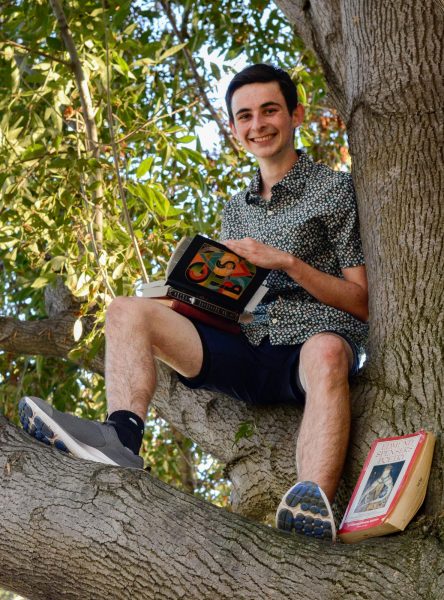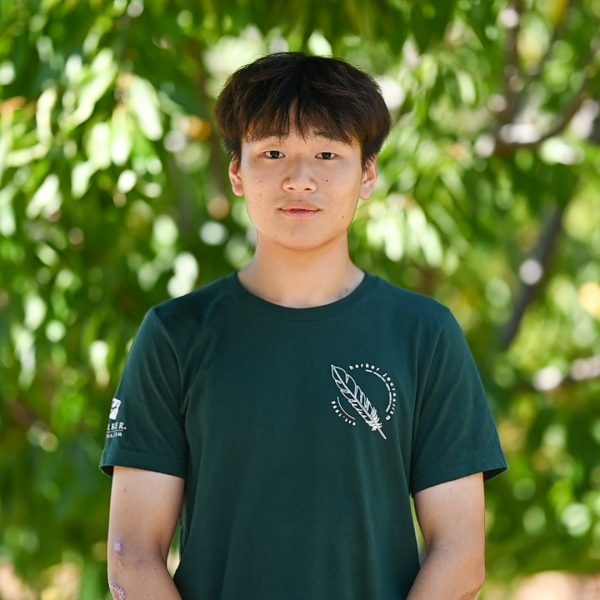
Dust flies into the air, the racers pant in the heat, and the coaches, teammates and spectators cheer on the competitors through the final stretch of the three-mile cross-country course. Amongst the swarms of runners, senior Harriss Miller speeds forward, closing the gap between himself and the finish line — no twisting paths, muddy grass, or hilly terrain can stop him now. Motivated by grit, Harriss frees his mind and thinks only of beating his competition.
“I don’t think there’s any ecstasy quite like hitting a personal record in a difficult course; there’s something really joyful there, and it’s a very rewarding experience,” Harriss said. “There’s a runner’s high. Your brain gets pumped with endorphins when you’re running to make you feel better.”
Starting with middle school track and field, Harriss discovered his love for running and competing alongside teammates, and he continued this passion into high school, joining the cross-country team in ninth grade. Despite the importance of solo performance, Harriss cares for his team, setting an example by leading practices. He lifts team spirits and inspires others to excel, like his teammate and close friend, senior Marcus Blennemann.
“I’ve seen him absolutely destroy all our race times,” Marcus said. “He motivated me to show up, to practice and to work hard. He really pushes me to become a better runner and a stronger person. His camaraderie is always good because life gets tough and demoralizing.”
Running gives Harriss time to take a step back and introspect alone. The sport creates an outlet to destress from school work or personal stresses.
“Running is a good way to connect with nature because you can go into a persona,” Harriss said. “Running around in the outdoors, breathing in the air, being able to distance yourself from school and work. I have the freedom of running, not having a goal, and thinking ‘I have to return to Earth in 40 minutes, but for now I can go on a long run.’”
In addition to freeing his mind with running, Harriss also decompresses by writing down his thoughts. He turns to his pen and paper to temporarily escape and think to himself about how he’s truly feeling.
“If I have thoughts, I put them down, and if I coagulate what I’m thinking into one line of thought, then I can ground myself,” Harriss said. “It’s a freeing experience and a process of getting me to express what I’m feeling at the moment. It accentuates what I’m feeling.”
Harriss carries his love for writing into the classroom. In English Department Chair Pauline Paskali’s Honors English 3 class, Harriss ignited and led discussions that involved the entire class. Throughout the study of American literature, Dr. Paskali admired the impact of individualistic philosophy on Harriss’s character.
“He’s a nature person and finds solace in nature, and it was eye-opening for him to get to read Emerson and Thoreau and to see the world articulated through the eyes of those who appreciate the importance of human connection to nature,” Dr. Paskali said. “I’m proud and thrilled that he’s this wonderful human being with his kindness, his goofiness, his fun, his cleverness and his intellect.”
Introduced to an array of thinking frameworks from his junior year English class, Harriss developed an interest in how studying them can improve his personal character. From Fyodor Dostoevsky’s philosophical storytelling to Dave Eggers’s blunt narration, Harriss expanded his literary meta, and thus, his repertoire of ways to direct his own life.
“I don’t want to write something where the reader can turn their brain off like a rom-com or vampire novel,” Harriss said. “I always try to instill something deeper in there because I like personal themes of how life is really meaningless, but there’s a lot of ways to find meaning if you have emotion.”
The dedication to writing compelled Harris to explore other art forms like photography. Visual Arts Department Chair Josh Martinez, who taught Harriss in Photography and Advanced Photography, notices Harriss’s calm temperament through his art.
“I remember him going way beyond the requirements of the assignment and thinking deeply about the connections between the images that he was making,” Martinez said. “He was ahead of the curve in his understanding of the content and relationship between images, and he carried on with the depth of his projects in a way that you don’t see a lot of students do.”
Learning from his own experiences and the writers he admires, Harriss developed an even more positive approach on life. Harriss realizes the inevitability of setbacks and the importance of recovering and seeking a new purpose without losing motivation.
“Although things might seem bleak, you can always find something inside to push you on,” Harriss said. “I want to be remembered as a happy guy. I want to have the passion to be happy with whatever I’m doing and inspire people to keep going.”




![LALC Vice President of External Affairs Raeanne Li (11) explains the International Phonetic Alphabet to attendees. "We decided to have more fun topics this year instead of just talking about the same things every year so our older members can also [enjoy],” Raeanne said.](https://harkeraquila.com/wp-content/uploads/2025/10/DSC_4627-1200x795.jpg)


















![“[Building nerf blasters] became this outlet of creativity for me that hasn't been matched by anything else. The process [of] making a build complete to your desire is such a painstakingly difficult process, but I've had to learn from [the skills needed from] soldering to proper painting. There's so many different options for everything, if you think about it, it exists. The best part is [that] if it doesn't exist, you can build it yourself," Ishaan Parate said.](https://harkeraquila.com/wp-content/uploads/2022/08/DSC_8149-900x604.jpg)




![“When I came into high school, I was ready to be a follower. But DECA was a game changer for me. It helped me overcome my fear of public speaking, and it's played such a major role in who I've become today. To be able to successfully lead a chapter of 150 students, an officer team and be one of the upperclassmen I once really admired is something I'm [really] proud of,” Anvitha Tummala ('21) said.](https://harkeraquila.com/wp-content/uploads/2021/07/Screen-Shot-2021-07-25-at-9.50.05-AM-900x594.png)







![“I think getting up in the morning and having a sense of purpose [is exciting]. I think without a certain amount of drive, life is kind of obsolete and mundane, and I think having that every single day is what makes each day unique and kind of makes life exciting,” Neymika Jain (12) said.](https://harkeraquila.com/wp-content/uploads/2017/06/Screen-Shot-2017-06-03-at-4.54.16-PM.png)








![“My slogan is ‘slow feet, don’t eat, and I’m hungry.’ You need to run fast to get where you are–you aren't going to get those championships if you aren't fast,” Angel Cervantes (12) said. “I want to do well in school on my tests and in track and win championships for my team. I live by that, [and] I can do that anywhere: in the classroom or on the field.”](https://harkeraquila.com/wp-content/uploads/2018/06/DSC5146-900x601.jpg)
![“[Volleyball has] taught me how to fall correctly, and another thing it taught is that you don’t have to be the best at something to be good at it. If you just hit the ball in a smart way, then it still scores points and you’re good at it. You could be a background player and still make a much bigger impact on the team than you would think,” Anya Gert (’20) said.](https://harkeraquila.com/wp-content/uploads/2020/06/AnnaGert_JinTuan_HoHPhotoEdited-600x900.jpeg)

![“I'm not nearly there yet, but [my confidence has] definitely been getting better since I was pretty shy and timid coming into Harker my freshman year. I know that there's a lot of people that are really confident in what they do, and I really admire them. Everyone's so driven and that has really pushed me to kind of try to find my own place in high school and be more confident,” Alyssa Huang (’20) said.](https://harkeraquila.com/wp-content/uploads/2020/06/AlyssaHuang_EmilyChen_HoHPhoto-900x749.jpeg)



